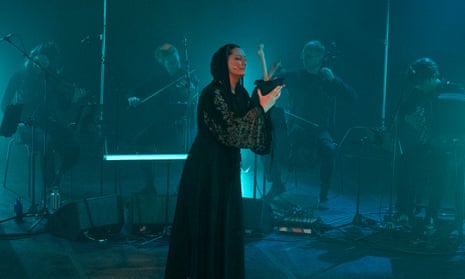Alice Zawadzki has already established a reputation as a jazz singer, but this project with the Manchester Collective also engaged her talents as a violinist and composer. The concept for Bag of Bones, a monodrama in four sung scenas, stemmed from a poem by Zawadzki’s Polish grandmother, Irena Protassewicz, written on the eve of the second world war, which Zawadzki uses to explore her own cultural roots while honouring her grandmother.
Walking slowly down the auditorium steps towards the stage, Zawadzki first appeared as an old woman, clutching the titular bag, from which she drew out bones, held tightly as though holy relics, sacred remains of a lost lover. Every utterance took on a ritualistic quality, as did her playing of a tiny violin, its neck and scroll fashioned from a humerus. The shock of it then being smashed on the ground was akin to the climax of Peter Maxwell Davies’s 8 Songs for a Mad King.
If there was an obsessiveness about the protagonist’s attachment to the bones – with its parallel metaphor of emotional baggage – her progress towards healing and resolution emerged gradually, symbolically embracing freedom, which was the final word of a Polish folk song, Zawadzki’s voice always richly emotive. In this semi-staging, lighting was basic but effective, the crackle and spit of imagined flames adding to the tension of the Ballad of the Woman With Burning Hands.
As a single body of work, it would not have made as substantial a piece of music theatre without the collaborative involvement of the Manchester Collective – string quartet, piano and accordion – and their musical interludes, judiciously chosen to link Zawadzki’s scenas and create an overall flow. David Lang’s Mystery Sonata, Joy, played by the group’s music director, violinist Rakhi Singh, established a reflective mood that returned at the end of Górecki’s Second String Quartet and later in Andrea Tarrodi’s Miroirs, while South American songs in arrangements by Misha Mullov-Abbado were seductively sung by the string players. That such disparate elements succeeded in resonating hauntingly together said much for the collective sensibility.

Comments (…)
Sign in or create your Guardian account to join the discussion